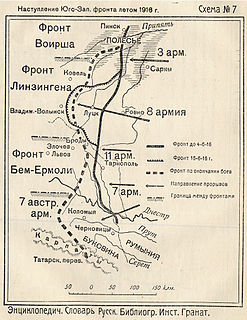
The Gorlice–Tarnów offensive during World War I was initially conceived as a minor German offensive to relieve Russian pressure on the Austro-Hungarians to their south on the Eastern Front, but resulted in the Central Powers' chief offensive effort of 1915, causing the total collapse of the Russian lines and their retreat far into Russia. The continued series of actions lasted the majority of the campaigning season for 1915, starting in early May and only ending due to bad weather in October.

The Russian Caucasus Army of World War I was the Russian field army that fought in the Caucasus Campaign and Persian Campaign of World War I. It was renowned for inflicting heavy casualties on the opposing forces of the Ottoman Empire, particularly at the Battle of Sarikamish. It was also known for its extremely diverse ethnic composition, consisting of units from throughout the Russian Empire and both soldiers and officers from the many ethnic communities settled since the 1877-78 Russo-Turkish War in the militarily administered Kars Oblast in the Russian Transcaucasus. These included Georgians, Caucasus Greeks, and Armenians - the latter in particular strongly represented among both the soldiers and senior officers - as well as ethnic Russians and Ukrainians.

The Russian Third Army was a World War I Russian field army that fought on the Eastern theatre of war.
The 3rd Army Corps was an Army corps in the Imperial Russian Army formed on 19 February 1877.

The Northern Front was an army group of the Imperial Russian Army during the World War I. It was responsible for carrying out operations against the Central Powers along a front line that stretched 280 kilometers, from Riga in the north down to northern Belarus. It was established in August 1915 when the Northwestern Front was split into the Northern and Western Front following the Great Retreat, and existed until the demobilization of the Russian army in 1918 due to the unrest from the Russian Revolution. In 1917 it had a total troop strength of 1.4 million men.
The 11th Army Corps was an Army corps in the Imperial Russian Army
The 27th Infantry Division was an infantry formation of the Russian Imperial Army. It was a part of the 3rd Army Corps.
The 13th Army Corps was a corps of the Imperial Russian Army, formed in the 1870s. The corps fought in the Russo-Turkish War and World War I, and was disbanded with the collapse of the Imperial Russian Army after the Russian Revolution. During peacetime, it was stationed in the Moscow Military District.
The 6th Army Corps was an Army corps in the Imperial Russian Army.
The 7th Army Corps was an Army corps in the Imperial Russian Army.
The 10th Army Corps was an Army corps in the Imperial Russian Army.
The 15th Army Corps was an Army corps in the Imperial Russian Army.
The 16th Army Corps was an Army corps in the Imperial Russian Army.
The 17th Army Corps was an Army corps in the Imperial Russian Army.
The 21st Army Corps was an Army corps in the Imperial Russian Army.
The 22nd Army Corps, was a tactical formation of the Imperial Russian Army based in the Grand Duchy of Finland before the beginning of the First World War. After seeing much service during the war, the corps was disbanded following the October Revolution.
The 23rd Army Corps was an Army corps in the Imperial Russian Army.
The 24th Army Corps was an Army corps in the Imperial Russian Army.
The 1st Guards Corps was a corps-level command in the Russian Imperial Army that existed in the decades leading up to and during World War I. Stationed in St Petersburg, it included some of the oldest and best known regiments of the Emperor of All Russia's Imperial Guard.

The 5th Siberian Army Corps was an Army corps in the Imperial Russian Army.




